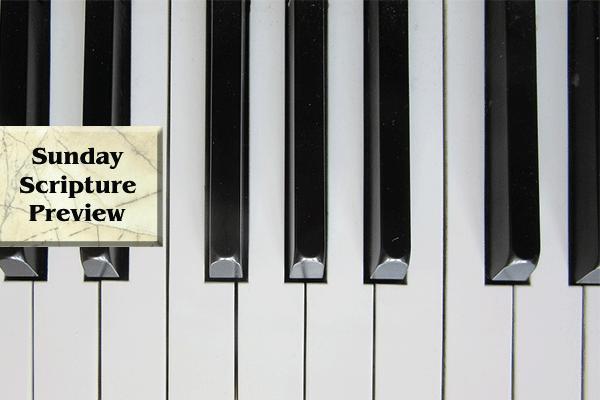
View the readings for this Sunday.
Sunday, Aug. 12 - 19th Sunday in Ordinary Time
1 Kings 19:4-8
Ps 34:2-3, 4-5, 6-7, 8-9
Eph 4:30-5:2
Jn 6:41-51
By Marc Massery
Growing up, I remember my grandmother, my only brother, and my only sister all reading sheet music and playing the piano well. My house had an upright as well as a baby grand piano. My aunt taught lessons, my parents paid for me to take them, and I had a natural ear for music.
But I refused to submit to the discipline of practicing and ended up quitting lessons. To this day, I regret never having learned how to read sheet music. I had all the talent, all tools I needed to accomplish this goal, but in my willfulness, I chose not to take advantage of them.
In the readings this weekend, we learn about how God provides us more than enough grace. Still, we must choose to accept it.
In the first reading from the book of Kings, we meet Elijah fleeing into the wilderness, escaping Queen Jezebel who intends to kill him.
In the desert, Elijah suffers so much grief that he collapses beneath the cover of a lonely tree and prays for death. He says, "This is enough, O LORD! Take my life, for I am no better than my fathers" (1 Kings 19:4). In other words, he believes he will have the same fate as the Israelites who died in the desert after escaping Egypt.
But then an angel appears to him and feeds him hearth cakes and water. After receiving the sustenance he needs, he decides to pick himself up and persevere.
Scripture says, "Strengthened by that food, he walked forty days and forty nights to the mountain of God, Horeb." (1 Kings 19:8).
In the Gospel reading this weekend, Jesus says, "I am the bread that came down from heaven ... Your ancestors ate the manna in the desert, but they died; this is the bread that comes down from heaven so that one may eat it and not die" (Jn 6:48-50).
Both the Israelites and Elijah experienced the agony of the desert. They also both received bread from Heaven, giving them the strength to endure.
But after the Israelites received their divine sustenance, they remained in their sorrow, ultimately rebelling against the Lord. As a result, they died a shameful death, missing out on the blessing of entering the Promised Land.
Elijah, on the other hand, did not disdain the divine nourishment he received. With the assistance of heavenly food, he submitted to the discipline of the desert, ascended Mount Horeb, and there, encountered the presence of the Lord.
Everyone will face the pain of the desert at some point. There, we have a choice. We can persevere, like Elijah, relying on the strength of the spiritual nourishment the Lord provides. Or we can disdain His grace, like the Israelites, remain in our sorrow, and die in our own willful desertion.
The Lord offers us all the grace we need in the form of the most potent spiritual food - the Body, Blood, Soul, and Divinity of Jesus Christ. But merely receiving it does not save us. We must use the strength the Eucharist gives us to willingly follow God's ways.
As St. Faustina says in her Diary, "God never violates our free will. It is up to us whether we want to receive God's grace or not. It is up to us whether we will cooperate with it or waste it" (1109).
All the grace in the world cannot save us from our sinfulness without our cooperation. God gives us all grace we need to endure the hardships of life and become the people He created us to be. But the key to receiving the fullness of His grace lies in our acceptance of it.
View the previous Sunday Scripture Preview.

















